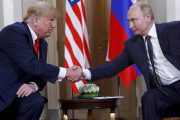
A story ran on the Oklahoma City NBC news affiliate on Wednesday reporting that “sporting goods stores in the Sooner state are seeing a spike in gun sales following President Barack Obama’s re-election.”
Similar reports ran nationwide after the president was elected the first time in 2008.
While many accused those making a run on gun stores of reacting rashly, there may be some wisdom in this latest sales spike.
Reuters reports that within hours of his securing his reelection, President Obama ordered the U.S. United Nations delegation to vote in favor of a UN proposal to fast track an international gun control treaty.
Immediately the word went out that the United States was going to play ball (after having scuttled the last round of talks on the Arms Trade Treaty in July), and a new round of negotiations on the treaty was scheduled for March 18-28 at the UN headquarters in New York City.
A press release was sent out early Wednesday morning from the United Nations General Assembly’s First Committee proclaiming the good news of President Obama’s go-ahead for the gun grab and setting the agenda for the next gun control conference:
Also kindling discussion among delegations was a draft resolution aimed at building on the progress made towards the adoption of a strong, balanced and effective arms trade treaty. That text would decide to convene the “Final United Nations Conference” for the creation of such a treaty in March 2013.
Also by that resolution, the draft text of the treaty submitted by the Conference’s president on 26 July would be the basis for future work, without prejudice to the right of delegations to put forward additional proposals on that text. The Committee approved the resolution as a whole by a recorded vote of 157 in favour to none against, with 18 abstentions.
No member, not even the United States, opposed the convening of a “Final United Nations Conference” for the establishment of a treaty imposing worldwide gun control regulations.
In July, 51 senators sent a letter to President Obama and Secretary of State Hillary Clinton encouraging them to “not only to uphold our country’s constitutional protections of civilian firearms ownership, but to ensure — if necessary, by breaking consensus at the July conference — that the treaty will explicitly recognize the legitimacy of lawful activities associated with firearms, including but not limited to the right of self-defense.”
The failure to pass an acceptable version of the treaty in July is in the president’s rearview mirror, however, as Reuters reports that “adoption of a strong, balanced and effective Arms Trade Treaty” could be imminent.
Reuters quotes Brian Wood of Amnesty International:
After today’s resounding vote, if the larger arms trading countries show real political will in the negotiations, we’re only months away from securing a new global deal that has the potential to stop weapons reaching those who seriously abuse human rights.
The definition of an “abuse” of “human rights” will be left up to a coterie of internationalist bureaucrats who will be neither accountable to nor elected by citizens of the United States.
With good reason, then, gun rights advocates oppose approval of this treaty.
After all, it does seem more than a little incongruous that a nation that places such a high value on gun ownership that it enshrined it in its Bill of Rights participates in an organization that opposes gun ownership so staunchly that it has an Office for Disarmament Affairs. An office, by the way, that the U.S. Deputy Director, Office of Weapons Removal and Abatement, Bureau of Political-Military Affairs, Steven Costner, proudly announced would be moving from Geneva to New York City.
Lest anyone believe the U.S. delegation official’s promise to Reuters that “we will not accept any treaty that infringes on the constitutional rights of our citizens to bear arms,” consider the fact that a report issued after the conclusion of the last Arms Trade Treaty (ATT) conference in July listed the goal of the agreement to be UN control of the “manufacture, control, trafficking, circulation, brokering and trade, as well as tracing, finance, collection and destruction of small arms and light weapons.”
That is a very comprehensive attack on “all aspects” of gun trade and ownership. Notably, the phrase “in all aspects” occurs 38 times in the draft of the ATT.
Particulars of the proposed treaty are set out on the UN Office for Disarmament Affairs website. Information presented there reveals that the international government-in-waiting wants to start by taking away weapons from “insurgents, armed gang members, pirates, and terrorists.”
Again, key definitions are left out of the document and others inexplicably and inexcusably ill-defined. Within the penumbras of these cleverly crafted provisions are found lurking the tools of tyranny. Wrenches that one day could force anyone branded as an enemy into a predetermined “terrorist” slot.
A question that must be considered is what the UN will consider “adequate laws.” Will the globalists at the UN consider the Second Amendment’s guarantee of the right to keep and bear arms without infringement to be a sufficient control on gun ownership?
The effort at eradication of private gun ownership is more insidious than it appears, however. On page 25 of the 1997 UN Secretary General’s Report on Criminal Justice Reform and Strengthening Legal Institutions Measure to Regulate Firearms (of which the United States was a signatory) a part of the regulations that we agreed to impose is a psychological test before one is allowed to purchase ammunition.
Apparently, the UN recognizes that without ammunition a gun is no more than a club, so in order to effectively disarm a population, the UN does not need to seize all the weapons; it merely has to prevent purchase of ammunition.
How does the ATT (and the Programme of Action that undergirds it) propose to enforce this anti-gun agenda?
Section III, Paragraphs 7 and 8 of the Programme of Action mandate that if a member state cannot get rid of privately-owned small arms legislatively, then the control of “customs, police, intelligence, and arms control” will be placed under the power of a board of UN bureaucrats operating out of the UN Office for Disarmament Affairs.
This provision includes the deployment of UN peacekeeping forces in a member state to seize and destroy “weapons stockpiles.”
Again, no definition of stockpile, but by that time it will be too late to make that argument.
In order to assist these blue-helmets and their disarmament overlords in their search and seizure of this ammunition, Section III, Paragraph 10 mandates that member states develop technology to improve the UN’s ability to detect stockpiles of ammo and arms.
This brings to mind the imminent deployment by the Department of Homeland Security (DHS) of portable invisible lasers developed by Genia Laboratories (a company created by CIA offshoot In-Q-Tel) that can detect even trace amounts of gun powder from over 50 yards away. The laser reportedly can penetrate walls, glass, and metal. DHS is scheduled to take possession of the devices later this month, according to testimony presented on Capitol Hill late last year.
History is instructive on this point as one recalls that the “shot heard ‘round the world” on Lexington Green was fired because King George sent British troops to seize the ammunition stockpile stored outside of Lexington.
A late night call from newly reelected President Obama to the UN has awakened Americans’ opposition to this latest attempt to abrogate the rights protected by the Second Amendment. It was a different late night call that roused sleepy colonists in defense of their right to bear arms, as well. This time, however, it is not the British who are coming for our guns and ammunition, but it is the United Nations and representatives of our own federal government.
Photos: (Left) In a Feb. 23, 2011, file photo President Barack Obama, with Secretary of State Hillary Rodham Clinton at right, speaks about Libya in the Grand Foyer of the White House in Washington; (right) the infamous “twisted gun” statue at UN headquarters.




